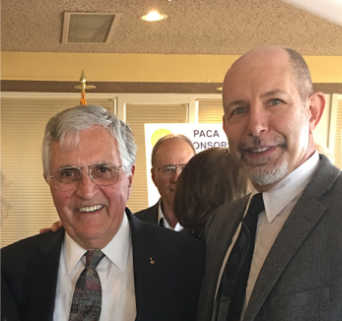
Barry A. Matsumori, Senior Vice President of Business Development and Advanced Concepts, VIRGIN GALACTIC
SCORPIO-V is the recently formed (2016) Space Systems division of HNu. The BioChip SpaceLab (BCSL) is the first space payload of the SCORPIO-V division. Under a highly-competed NASA IDIQ contract (NNJ16GU42B) HNu is to provide payload-specific integration and operations to support NASA and other federal agencies using the SCORPIO-V BCSL. Accommodation of the BCSL onboard the International Space Station (ISS) has been provided by NASA Space Act Agreement (SAA) SAA-0Z-14-18258. BCSL is currently in the process of passing through various space qualification toll gates in preparation for deployment on the ISS June 2018.
The HNu SCORPIO-V division has recently won a second NASA contract to produce a new payload, PIMMS, the Photonics ISS Multipurpose Microscopy Suite, a state-of-the-art instrument for multi-purpose high resolution imaging and microscopy. The HNu SCORPIO-V division has also received our third contract and payload which will fly on a Blue Origin New Shepard launch vehicle. Our proprietary prospectus shows that we are positioned for astronomical income and revenue growth.
The objective is to commercialize the BCSL and subsequent payloads produced by HNu’s SCORPIO-V division through outside investment and strategic partnering,. HNu intends to convert the SCORPIO-n division to a separate legal entity and will execute a 10- year renewable limited-use license for the technologies of each payload.
Overview: BCSL is an automated in vivo microfluidics and imaging platform for live-cell investigations in microgravity. The BCSL will be accessible to academic and industry researchers onboard the International Space Station National Lab. Briefly, BCSL will provide automated microfluidic delivery of multiple cell culture reagents, drugs, fluorescent probes and fixatives at pre-determined time intervals during the course of an environmentally-controlled experiment. Furthermore, BCSL is capable of imaging live-cell cultures with bright-field and fluorescent microscopy at a predefined frequency according to the researcher’s requirements. The BioChip sub-system of the platform will maintain live-cell cultures for days to weeks to months depending on the investigators’ experiment needs. The unique capabilities of the BCSL platform will offer investigators a diverse array of imaging and flexible experiment parameters to gather a comprehensive dataset for their microgravity investigations. BCSL has been designed to accommodate a wide selection of cell biology interrogations, including; adherent cells, suspension cells, stem cells, 3D cell aggregates, organoids or tissue-on-a-chip applications. The platform accommodates an array of cell biology investigations by offering six unique BioChip configurations customizable to a variety of experiments and/or cell lines. This comprehensive space laboratory platform is well-suited for live-cell assays conducted in micro-gravity.
Need: Space exploration missions have revealed that the condition of weightlessness in microgravity has profound and sometimes unanticipated effects on biological and physical mechanisms, behavior and phenomena. Understanding the role of microgravity in these occurrences can provide substantial advancements in knowledge for Earth-based processes, as well as to push the envelope and defining the roadmap for how mankind must operate, function and survive in the space environment. Indeed, the absence of gravity has a profound impact on organisms ranging from single-cells to human beings were cellular architecture and gene expression are modified.
See original article